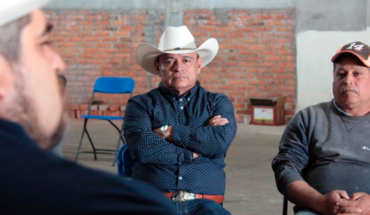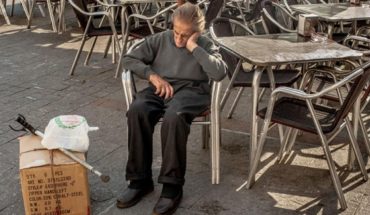Mazatlan, Sinaloa.- I will try to put together several ideas from two different documents. One is entitled Elements for the Construction of a State Policy for Security and Democratic Justice, dating from 2011, the product of a conference on security organized by UNAM in 2011, in which international experts participated for three days. Security levels have been rebounding since before that date. The second document is the Municipal Human Development Report 2010-2015. It was just introduced about three weeks ago, prepared by the United Nations Development Programme (UNDP). It emphasizes local system and subtitles: bringing together ideas from the local. The first document prepared by UNAM spoke of the primacy of prevention over control. The document says that the best prevention is the one that strengthens social cohesion and to that extent reverts to exclusion. The levels of security that we are living are no stranger to the lack of social cohesion, we have been magnifying a pattern of social exclusion since our history.
The question is who can regulate and attend to social cohesion and challenge social exclusion?
It said that document, we must promote the regulation of the social conflict that often presupposes the violation of criminal law. Who regulates social conflict, the authority is responsible for regulating social conflicts in communities. It is necessary to recognize the place of habitat in a regulation of crime prevention, as it contributes to safety or insecurity. We must promote the design of communities, plan safe public spaces. There is an important role in urban planning, in the design of cities, issues of street lighting, avoiding places of hiding, organization and mobility within communities, all this is no stranger to the issue of insecurity or security. The document also stated that much of citizen security stems from personal conflicts, problems between neighbors, families communities, which were not addressed in time. On the other hand, the United Nations Development Programme document measures the human development of municipalities and takes a number of measures. The last report presented three weeks ago measures the real and potential capacity of municipalities to achieve the sustainable development goals of the 2030 agenda. They are goals of the international community to try to lift the majority living in these conditions out of poverty. The general conclusion is that municipalities have great potential to achieve the goals. And I only give a little data. The report says that municipalities can directly and indirectly influence 129 of the 232 indicators that measure progress in sustainable development targets through their constitutional and legal powers, representing 52 per cent of the total. They have great potential. The problem, the report says, is that real capabilities do not correspond to their constitutional powers. 115 and other articles of the constitution or other federal laws assign a series of powers and powers to municipalities, even to all, without making distinctions, even to all, as if they were a single type of municipality, and that also seem that they do not have difficulties in resources, nor in qualified personnel, nor in organizational mechanisms if we speak, for example, of metropolitan areas. Obviously some municipalities have other capabilities. What contained in this document was an agenda of possible measures, reforms that could be taken to try to strengthen those capacities. UNDP’s proposals are very well-loaded on the fiscal side and it is certainly very important, but I have told colleagues that it is nothing more fiscal. I believe that, as part of this forum, we need to review what the agenda is, what is the discussion of municipal reform, beyond the fiscal question, because the way that the municipal authorities can respond to the demands of society has to do , yes, with the fiscal, but also with the way of working and the way of working has to do with the way that the town halls are integrated. We have to see what is the agenda of the municipal reform, mechanisms of election of members of the municipalities, form of government of the municipalities: model of metropolitan government, of course the fiscal question, citizen participation against social. And I end with this, in this discussion we must not, I think, start from scratch. We have been discussing this possible municipal reform agenda for 30 years or more. There have been some major reforms, 1983, 1999, but there are many reforms to be completed, everything that is being discussed must be discussed and from there to provide legislators, convene the legal academy, and to start a discussion convened on this occasion by the media. The best prevention is the one that serves local cohesion and to that extent strengthens cohesion in communities. And the best authority to deal with this is the municipality. It is the one that has the capacity to meet the needs, promote safe spaces, regulate conflicts between neighbors that then become problems of criminal and violence, everything takes us to the municipalities. And the municipality can’t do it alone. We need to find mechanisms to articulate the three powers of government and for everyone to do what they can do best. It is not only transferring powers and resources to municipalities, it is finding mechanisms of coordination and cooperation. The issue of general laws is that the best we should debate. There’s a kind of centralist conspiracy, says the general stance. Lawmakers pass laws, and is everyone involved in the centralist conspiracy? There are research groups at UNAM, I lead it, we have been doing research and agenda for some time. We must not walk alone, but move forward by incorporating constitutionalist professors and lawyers from other universities. It would be a good opportunity to raise the collaboration with the chamber and accompany the legislative process, to take advantage of these networks. Slowly, but carefully go to the solid one that ends in the medium term, and with the accompaniment of the media. Conclusions:
To reiterate that we do not start from scratch, there are many proposals, we have been arguing for more than 30 years, forums after forums about reform not only the municipal but in general that of the federal system. I make available to you the topics that I have perceived, the topics of discussion: proposal to consolidate the constitutional status of the municipality, not anything more as an organizational body, not only as a governing body but as a body in which it manifests itself popular sovereignty. Mechanism of choice of the members of the town hall, the scheme of blocked or closed lists is the best or you can imagine some other type of system. This certainly belongs to local constitutionalism, not federal constitutionalism. There is a State of Nayarit that already has a different system. To think what else may come from subnational constitutionalism and that does not require constitutional reform at the level of the republic. The form of government in the municipalities. Today we have an over-represented majority presidential system, that’s the best thing or we could imagine a different scheme. Civil career service, professionalization of public service at the municipal level based on merit, equal opportunity, competence, quality and professionalism. Fiscal strengthening of the municipality, the issue of the property, the rules of federal allocations to states and municipalities. The issue of metropolitan governance, already more than 60 percent of the country’s population lives in metropolitan areas, there is a challenge. The federal constitution and the general urban settlement law regulate interstate conurbations, but intra-state constituencies correspond to municipal constitutions and laws. Establish a differentiated regime according to the type of municipality, one for metropolitan governments, another for urban, mixed, rural, touristic, indigenous and border. This is a proposal that advanced, but did not succeed on the part of Dr. Teresita Rendón, current rector of the University of Guanajuato.
Even regime for all or differentiated and according to the regime what competence and resources they might have. And the issue of citizen participation, advisory bodies, social comptrollership, citizen participation in administrative procedures on issues related to urban development.
Original source in Spanish





